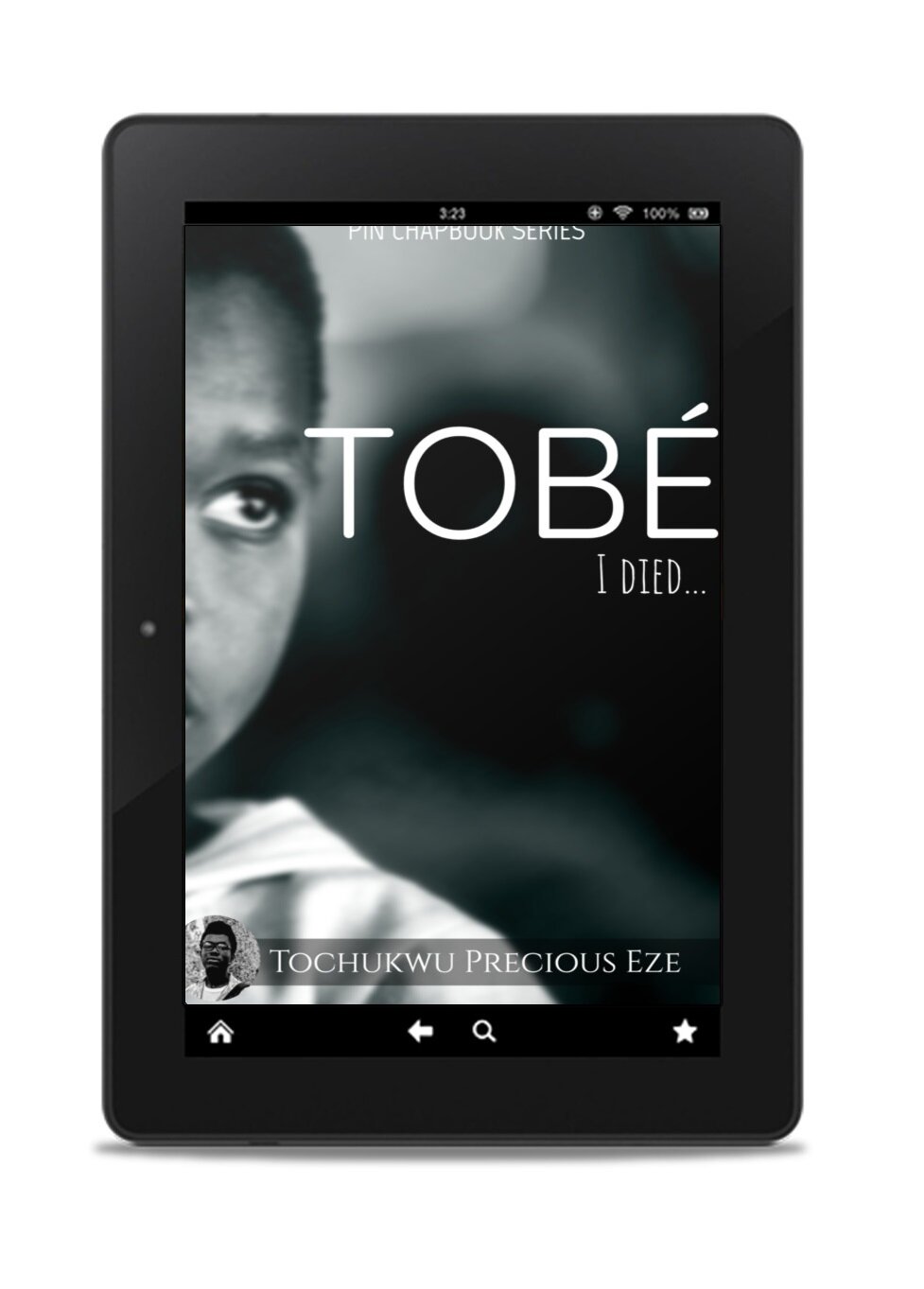Poetry is beautiful. Prose is also beautiful; but together, they are something special. Tochukwu Precious Eze’s Tobe is a smooth and effortless blend of prose and poetry to form the contemporary style of poetry popular amongst the new generation of Nigerian poets. Like every “good” piece of Literature, Eze’s Tobe has people at its core. He investigates and explores the multi-faceted human experience through his poet persona.
What is most striking about Eze’s Tobe as you attempt to familiarize yourself with its pages is the short story that is his prologue. This is unconventional as prologues are usually used in plays and in some cases, novels. So, to find one adorn the pages that welcome you to the prosaic poems that form the collection, Tobe, no doubt raises eyebrows. The prologue narrates the story of a (young) man who dies. Most significant is the first line where he is told “See you tomorrow,” by Sarah. Even though the details surrounding his death are hazy, the author fuses the African belief of premonition about death in the story. One notices that he does not follow his usual routine of using his phone while chatting with friends and there is an overall sense of urgency even as he consumes his last supper.
Noteworthy also, is the first poem in the chapbook is titled “Sarah”, like the character in the prologue. The poet persona seems to console Sarah about his sudden passing even after nodding to her desire to see him the next day. He assures her of her strength even though she might not know of it yet. “Hold out your firm black hands/Hands with which you once stroke my fresh jaw/Close your ever-loving eyes/I promise you’ll be fine,” the poet persona acknowledges that even though things she cannot get rid of, like her hands, might remind her of him, she would still be fine. In the following lines, the poet persona also seems to promise his presence, even in death, “Fall back/Trust that my arms will catch you.” “Worry not about what comes next/Do not hold me, for you will not fall/I will slowly put you down.”
 With Tobe, the poet is on a mission to console all who knew him. In “People Die Anyway, Especially Where I Come From,” the poet persona lists a number of gruesome ways he could have died, thanks to the nonchalance of the Nigerian government. From “a shot to the chest by an armed man in uniform” to a faulty generator in the hospital during an emergency, a suicidal boy who was mocked for being depressed even after two attempts at death, and a girl whose village was ravaged by savages; each one more gruesome than the last. The poet persona concludes, I am dead, but I dare not complain/For I’ve survived some 22 years since childbirth/Men in uniforms harassed but never shot at me/Savages never found my hometown and I never left my country/My life was a good one, and so was my death.
With Tobe, the poet is on a mission to console all who knew him. In “People Die Anyway, Especially Where I Come From,” the poet persona lists a number of gruesome ways he could have died, thanks to the nonchalance of the Nigerian government. From “a shot to the chest by an armed man in uniform” to a faulty generator in the hospital during an emergency, a suicidal boy who was mocked for being depressed even after two attempts at death, and a girl whose village was ravaged by savages; each one more gruesome than the last. The poet persona concludes, I am dead, but I dare not complain/For I’ve survived some 22 years since childbirth/Men in uniforms harassed but never shot at me/Savages never found my hometown and I never left my country/My life was a good one, and so was my death.
Tochukwu Precious Eze’s Tobe begins and ends with who was the object of the poet persona’s love, Sarah. In “Sarah, for Real this Time,” he pours out his romantic feelings for her, some of which he never expressed while he was alive. The poet persona, now free of the fear he felt while he was alive now freely expresses all that he could not say. “I see you. You’re the only one that I see/ My fears died alongside my liver/The eyes that could not look into yours are closed now/The mouth that could not speak of my dreams/Now wishes to say ‘I like you.’”
Still, no matter what he feels or says, he is dead and gone. All that is left is his “cold hands, dry lips which will never rise again.” A sad tale.
Tochukwu Precious Eze’s Tobe is an interrogation of the ups and downs that come with life, especially when you live in a country like Nigeria that has almost no regard for the life of its citizens. For Tobe, life is a sad tale and true freedom is found in death.
ABOUT THE REVIEWER
Temi tope Abigail Larayetan, a three-time Nigerian Students Poetry Prize (NSPP) outstanding entrant, is a graduate of English Language and Literature from the University of Lagos. Temitope’s short story was published by Farafina in the International Sisi Eko anthology. She currently blogs at “Medium” where she wrote every day of 2019 as a personal challenge.
tope Abigail Larayetan, a three-time Nigerian Students Poetry Prize (NSPP) outstanding entrant, is a graduate of English Language and Literature from the University of Lagos. Temitope’s short story was published by Farafina in the International Sisi Eko anthology. She currently blogs at “Medium” where she wrote every day of 2019 as a personal challenge.


Beautiful!